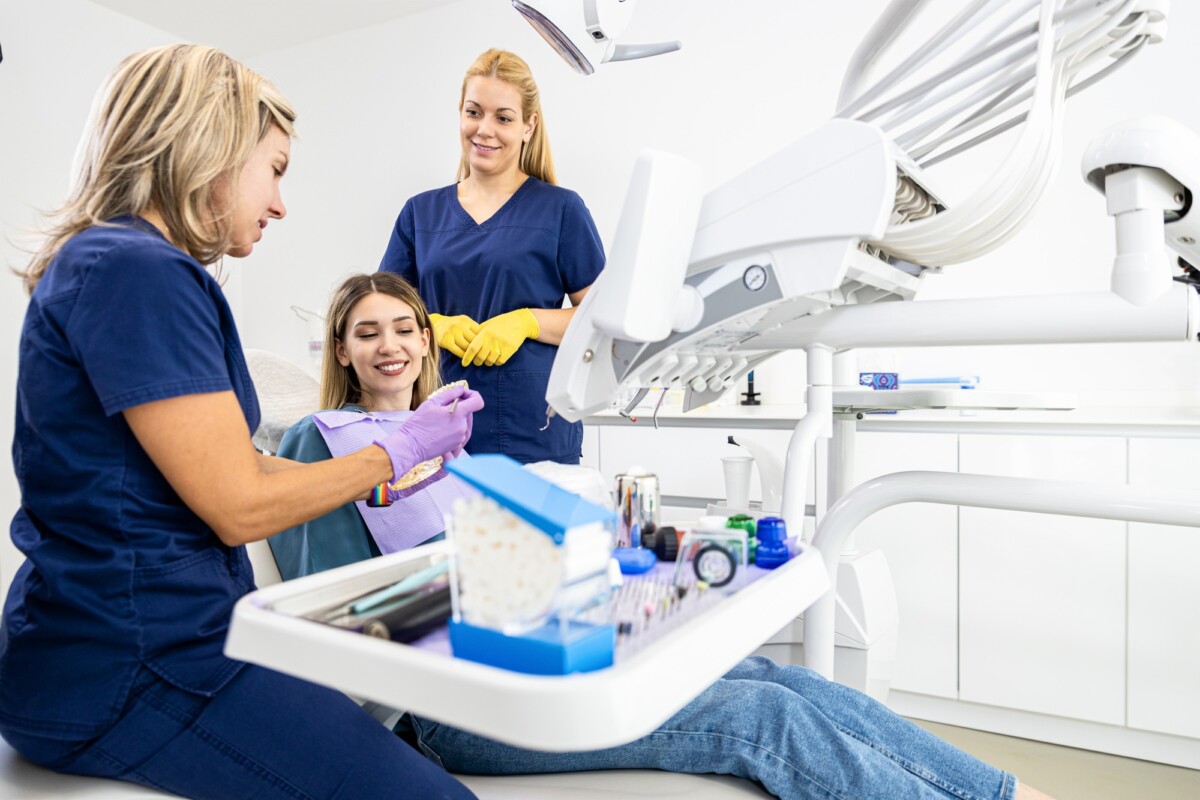Dental Repair Cost: A Quick Guide to Prices and Procedures
[tta_listen_btn]
Dental repair cost can be a source of anxiety for many, making it essential to understand these expenses for effective budgeting and care. Dental repairs range from simple fillings to complex procedures like crowns and root canals, and knowing what to expect can help you make informed decisions about your oral health.
What Influences Dental Repair Costs?
Location: Costs vary significantly by geographic area, with urban centers typically being more expensive.
Type of Procedure: Prices differ; fillings may cost $100 to $300, while root canals can range from $700 to $1,500.
Insurance Coverage: Dental insurance can greatly impact out-of-pocket costs, so understanding your plan is crucial.
Dentist’s Experience: More experienced dentists may charge higher fees, but their expertise can lead to better outcomes.
Average Costs of Common Dental Repairs
Fillings: $100 – $300
Crowns: $800 – $2,000
Root Canals: $700 – $1,500
Tips for Managing Dental Repair Costs
- Shop Around: Consult multiple dentists for price comparisons.
- Ask About Payment Plans: Many offices offer financing options.
- Consider Dental Schools: Services are often available at reduced rates.
- Maintain Regular Check-ups: Preventive care can help avoid costly repairs.
Understanding these costs is vital for ensuring you receive necessary care without financial strain.
Factors Influencing Dental Repair Costs
Dental care is essential for maintaining overall health, yet it often gets overlooked. Understanding dental repair costs is vital for making informed decisions about oral health. These costs can vary widely, from routine cleanings to complex procedures, and knowing the factors that influence them can help you budget effectively and avoid surprises.
Several key factors impact the overall cost of dental repairs:
Location of the Dental Practice
- Urban practices typically charge more due to higher overhead costs.
- Costs can also vary by region, influenced by local economies and demand.
Type of Procedure
- Simple procedures like fillings are generally less expensive than complex ones such as root canals or crowns.
- The choice of materials (e.g., porcelain vs. composite) can also affect costs.
- Insurance coverage may reduce out-of-pocket expenses for certain procedures.
Dentist’s Experience and Reputation
- More experienced dentists often charge higher fees due to their expertise.
- Specialists, like oral surgeons, typically have higher rates than general dentists.
- A dentist with excellent reviews may command higher prices due to increased demand. By understanding these factors, you can navigate dental repair costs more effectively and make informed choices for your oral health.
Common Types of Dental Repairs and Their Costs
Understanding the costs associated with dental repairs is essential for maintaining oral health. Dental repair costs can vary significantly based on the procedure, materials, and location of the dental practice. Here’s a look at some common types of dental repairs and their costs.
Fillings
- Cost Range: $100 – $500 per filling based on material (amalgam, composite).
- Overview: Fillings treat cavities and restore tooth function, with costs varying by cavity size and material choice.
Crowns
- Cost Range: $800 – $3,000 per crown, depending on material (porcelain, metal).
- Overview: Crowns protect severely damaged or decayed teeth, with costs influenced by procedure complexity and materials.
Root Canals
- Cost Range: $700 – $1,500 based on tooth location and complexity.
- Overview: Root canals save infected or decayed teeth, with costs varying by tooth type and potential additional treatments.
Bridges and Dentures
- Cost Range: $1,500 – $5,000 for bridges; $1,000 – $3,000 for dentures.
- Overview: Bridges replace missing teeth, while dentures replace full sets, with costs varying by materials and fitting complexity. Consult your dentist for personalized estimates.
Insurance Coverage for Dental Repairs
Understanding the costs associated with dental repairs is crucial for maintaining dental health. These costs can vary significantly based on the procedure, materials, and location of the dental practice. Having insurance coverage can alleviate the financial burden, making it essential to know what your plan covers.
Dental Repairs
Most dental insurance plans offer some level of coverage for necessary repairs, but specifics can vary. Here’s a breakdown of coverage types:
- Preventive Care: Routine check-ups and cleanings are usually covered, helping to prevent more costly repairs.
- Basic Procedures: Fillings and extractions are often partially covered.
- Major Procedures: Crowns, bridges, and dentures typically have higher out-of-pocket costs, as they may only be partially covered.
Many plans have an annual maximum benefit ranging from $1,000 to $2,000. Once this limit is reached, you are responsible for any additional costs. Some plans may also have waiting periods for major repairs, so it’s important to read the fine print.
Out-of-Pocket Expenses
- Deductibles: The amount you pay before insurance coverage begins.
- Co-pays: Fixed amounts paid for each visit or procedure.
- Coinsurance: The percentage of costs you pay after meeting your deductible.
Understanding these terms helps you prepare for potential dental repair costs, ensuring you budget appropriately for treatments.
Cost Comparison: Dental Repairs vs. Other Medical Procedures
Dental repair costs can be a surprising aspect of healthcare expenses, often assumed to be less than other medical procedures. However, this assumption can be misleading. Understanding these costs is essential for making informed healthcare spending decisions.
Understanding Dental Repair Costs
- Dental repairs include fillings, crowns, root canals, and extractions.
- Costs can range from $100 for a filling to over $1,500 for a crown.
- Many procedures are not covered by insurance, increasing out-of-pocket expenses.
For example, a root canal can cost between $700 and $1,500, contrasting sharply with minor surgeries that may be covered by insurance.
Comparing Costs with Other Medical Procedures
- Emergency room visits can range from $150 to $3,000.
- Routine exams typically cost $100 to $250 and are often covered by insurance.
- Dental repairs usually require full payment upfront, creating a financial burden.
Insurance Coverage and Out-of-Pocket Expenses
- Dental insurance often covers only about 50% of major procedures.
- Patients may face significant out-of-pocket costs, unlike medical procedures that are often covered at a higher percentage.
This disparity emphasizes the need to understand insurance plans and budget for dental care effectively.
Tips for Managing Dental Repair Costs
Dental repair costs can be a significant concern for many individuals. Understanding these costs and how to manage them effectively can alleviate financial stress associated with dental procedures. Whether it’s a routine filling or a complex root canal, knowing what to expect aids in planning and budgeting.
1. Get a Detailed Estimate
Before any procedure, ask your dentist for a detailed estimate of the dental repair cost, including follow-up visits and potential additional costs like anesthesia or X-rays. This clarity helps avoid unexpected expenses.
2. Check Your Insurance Coverage
Review your dental insurance policy to understand coverage for procedures, which can significantly reduce out-of-pocket expenses.
- Know Your Benefits: Familiarize yourself with coverage limits.
- Pre-Authorization: Some insurers require pre-authorization for certain procedures.
3. Explore Payment Plans
Many dental offices offer payment plans to spread costs over several months, making larger expenses manageable.
- In-House Financing: Ask about in-house options.
- Third-Party Financing: Consider options like CareCredit for low or no-interest payments.
4. Look for Discounts and Promotions
Some practices offer discounts for new patients or seasonal promotions.
- Membership Plans: Some dentists provide yearly membership plans for discounts.
- Community Health Clinics: Check for clinics offering reduced-rate services.
5. Maintain Good Oral Hygiene
Preventive care is key to avoiding costly repairs. Regular check-ups and good oral hygiene can catch issues early.
- Regular Visits: Schedule check-ups every six months.
- Daily Care: Brush and floss daily to reduce the risk of cavities.
- Statistics show that regular dental visits can save up to 40% on repair costs, making it a worthwhile investment.
FAQs
How much does tooth repair cost?
Tooth repair costs vary widely—from $100 for minor fillings to $1,000+ for crowns or root canals, depending on the damage and treatment needed.
How much to repair a tooth?
Simple repairs like fillings can cost $100–$300, while more complex procedures like crowns or bonding may range from $500 to $2,000.
How much does it cost to fix rotten teeth?
Fixing rotten teeth can cost $300 to $3,000+ depending on severity, number of teeth affected, and whether extractions, root canals, or crowns are needed.
What is the cheapest way to repair a damaged tooth?
The most affordable option is usually dental bonding or a filling, which may cost as little as $100–$200 without insurance.
The easiest way to compare Medicare plans—visit NewMedicare.com or call 📞 (833) 203-6742!






